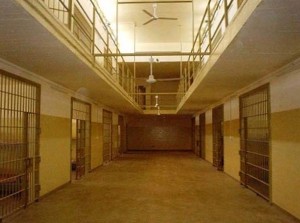“If there is a causal mechanism, what might it be?”
 Tehran, March 10 – Researchers studying social, political, and demographic trends in the Islamic Republic of Iran have discovered what they claim is a strong statistical correlation between conducting polls in the country and ending up in prison, an article in the journal Statistics reports.
Tehran, March 10 – Researchers studying social, political, and demographic trends in the Islamic Republic of Iran have discovered what they claim is a strong statistical correlation between conducting polls in the country and ending up in prison, an article in the journal Statistics reports.
According to the article, due for publication in this month’s issue, researchers have documented a correlation higher than ninety percent between embarking on efforts to elicit and collate the opinions of Iranians on various issues and becoming acquainted with the inside of a dank prison cell. The researchers noted no significant differences in the correlation among different demographic groups.
Lead authors Aimso Sorri and Aiwil Neverdoitagain wrote that the study was made possible through the generous and felicitous help of the Iranian government, which provided various incarceration facilities for purposes of the research, and enthusiastically assisted the pollsters in establishing the link.
“It is a testament to the continuing trend of moderation in Iranian society and government that we were able to conduct this study,” wrote Sorri and Neverdoitagain, nervously looking at someone just out of the frame. “We hope this information will be useful to anyone who has designs on conducting surveys in the Islamic Republic.”
Experts note that is is still premature to establish direct causation, but that further study is warranted to confirm such a link. “I would say that while everyone knows correlation does not equal causation, the striking level of correlation between polling and imprisonment all but demands investigation,” said polling consultant Klu Liss. “If there is a causal mechanism, what might it be? Speculation can be exciting, but what’s needed for now is more raw data before we can establish any promising directions.”
A slightly weaker correlation was found between responding helpfully to polls and imprisonment, a trend that analysts say also invites further examination. “There is clearly some matrix of factors in play here that we have to identify before drawing even preliminary conclusions,” explained statistician Censor Shipp. “I’d be happier if we had other useful data, such as the general incarceration rate, but that does not appear to be readily available. What does seem to be the case, however, is that attempts to obtain reliable, hard numbers on the general incarceration rate in Iran similarly correlates with being incarcerated.” He declined to elaborate on why that might be the case, saying only that it may forever remain a mystery.
Please support our work through Patreon.




